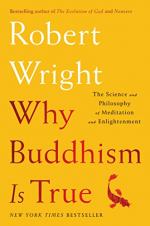
|
| Name: _________________________ | Period: ___________________ |
This quiz consists of 5 multiple choice and 5 short answer questions through Chapters 4-6.
Multiple Choice Questions
1. When ancient Buddhist writings mention the term sati, what does the word mean in English?
(a) Stillness.
(b) Peace.
(c) Tranquility.
(d) Mindfulness.
2. The Buddha stated that what emotion has a "poisoned root and honeyed tip" (30)?
(a) Jealousy.
(b) Ecstasy.
(c) Pride.
(d) Anger.
3. The author presents a scenario wherein someone imagines his or her speech is going to go badly, but it goes fine. What term does the author give to this phenomenon?
(a) A metta experience.
(b) A conundrum.
(c) A triumph.
(d) A false positive.
4. The Buddah stated that what element is impermanent?
(a) Life.
(b) Feeling.
(c) Englightenment.
(d) Self.
5. The author explains that the book Buddhism is True is an attempt to do all but which of the following things?
(a) To show people the door.
(b) To point out the window.
(c) To give people some idea of what lies beyond the door.
(d) To explain from a scientific standpoint why what lies beyond the door contains more reality than the one people have come to accept.
Short Answer Questions
1. What is NOT an element the author lists as being said by Jesus Christ?
2. What ratio does the author say he usually experiences throughout a meditation retreat when he mentions that part is bliss and part is difficult?
3. What is NOT a concern the author attributes to the process of natural selection?
4. In what year did the author of the book What the Buddah Taught write the work?
5. What emotion does the author NOT list as one that is likely to arise when one feels that meditation is not going well?
|
This section contains 305 words (approx. 2 pages at 300 words per page) |

|




